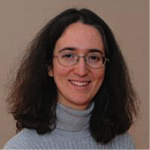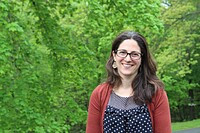Research on the production, use, and disposal of artificial turf has brought to light concerns over environmental contamination, human health hazards, and adverse effects on wildlife. Researchers have studied a variety of contaminants found in artificial turf and different types of infill used to soften its surfaces. Concerns have been raised about polyaromatic hydrocarbons (PAHs), heavy metals, per- and polyfluoroalkyl substances (PFAS), 6PPD-quinone, and microplastics, among others. Studies have also examined heat related illnesses, skin infections, and other human health concerns.
Dr. Rachel Massey and Lindsey Pollard discussed the research they have conducted at the Toxics Use Reduction Institute (TURI) on health and environmental implications of artificial turf and safer alternatives. They described their research on materials used as artificial turf infill, including waste tire materials. They also touched upon emerging information on chemicals in artificial turf grass blades, as well as other health and environmental concerns associated with artificial turf, such as microplastic pollution and high surface temperatures. They briefly discussed their research on natural grass athletic fields as a safer alternative.
Dr. Zhenyu Tian briefly summarized the identification of 6PPD-quinone as a lethal toxicant for coho salmon, and will further introduce the comprehensive screening of organic contaminants in urban stormwater and tire wear particle leachate. He discussed knowledge gaps and ongoing research about crumb rubber infill materials.
To conclude, Dr. Sarah Evans spoke from a pediatric environmental health perspective, touching on routes of exposure and concerns specific to children, with an emphasis on what families and communities can do to use safer alternatives.
Featured Speakers
 Dr. Rachel Massey is Senior Associate Director and Senior Policy Analyst at the Toxics Use Reduction Institute (TURI) at the University of Massachusetts Lowell. Her projects include identifying toxics use reduction opportunities for Massachusetts businesses and communities; analyzing the implications of federal policy developments for chemical regulation at the state level; conducting policy analyses for updates to the list of chemicals reportable under the Toxics Use Reduction Act (TURA); and applying lessons from TURA to chemicals policy development nationally and internationally. She is the author of numerous reports and articles on chemicals policy, including reports for European government agencies and the United Nations on chemicals and development, chemicals in consumer products, and other related topics. In response to queries from Massachusetts schools and communities, she has worked with colleagues to assess and compare hazards of materials used in artificial turf and to identify safer alternatives. She holds a Master of Science in Environmental Change and Management from Oxford University, a Master of Public Affairs from the School of Public and International Affairs at Princeton University, and a Doctor of Science in Work Environment from the University of Massachusetts Lowell.
Dr. Rachel Massey is Senior Associate Director and Senior Policy Analyst at the Toxics Use Reduction Institute (TURI) at the University of Massachusetts Lowell. Her projects include identifying toxics use reduction opportunities for Massachusetts businesses and communities; analyzing the implications of federal policy developments for chemical regulation at the state level; conducting policy analyses for updates to the list of chemicals reportable under the Toxics Use Reduction Act (TURA); and applying lessons from TURA to chemicals policy development nationally and internationally. She is the author of numerous reports and articles on chemicals policy, including reports for European government agencies and the United Nations on chemicals and development, chemicals in consumer products, and other related topics. In response to queries from Massachusetts schools and communities, she has worked with colleagues to assess and compare hazards of materials used in artificial turf and to identify safer alternatives. She holds a Master of Science in Environmental Change and Management from Oxford University, a Master of Public Affairs from the School of Public and International Affairs at Princeton University, and a Doctor of Science in Work Environment from the University of Massachusetts Lowell.
 As Special Projects Research Associate at the Toxics Use Reduction Institute at the University of Massachusetts Lowell, Lindsey Pollard works on a variety of projects focused on researching chemical hazards associated with consumer materials, finding safer alternatives and sharing findings with communities. Some of her more recent work includes an alternatives assessment on artificial turf, working with the United Nations Environmental Programme on sound chemicals management guidance and working with the Green Chemistry and Commerce Council to find safer preservatives for personal care products. Prior to TURI, Lindsey worked in the field and lab as an aquatic ecologist at Arizona State University and the University of Texas at Austin Marine Science Institute. She received her Bachelor of Science and Master of Science degrees in biology from the University of North Carolina, Greensboro.
As Special Projects Research Associate at the Toxics Use Reduction Institute at the University of Massachusetts Lowell, Lindsey Pollard works on a variety of projects focused on researching chemical hazards associated with consumer materials, finding safer alternatives and sharing findings with communities. Some of her more recent work includes an alternatives assessment on artificial turf, working with the United Nations Environmental Programme on sound chemicals management guidance and working with the Green Chemistry and Commerce Council to find safer preservatives for personal care products. Prior to TURI, Lindsey worked in the field and lab as an aquatic ecologist at Arizona State University and the University of Texas at Austin Marine Science Institute. She received her Bachelor of Science and Master of Science degrees in biology from the University of North Carolina, Greensboro.
 Dr. Zhenyu Tian is an assistant professor at Northeastern University. He received his Ph.D. from UNC-Chapel Hill, and worked as a postdoc research scientist at the University of Washington Tacoma. His research uses cuttingedge methods in analytical chemistry, toxicology, and data analysis to identify emerging organic contaminants in the environment. He is curious about the contaminants that are most relevant to human's health and the ecosystem.
Dr. Zhenyu Tian is an assistant professor at Northeastern University. He received his Ph.D. from UNC-Chapel Hill, and worked as a postdoc research scientist at the University of Washington Tacoma. His research uses cuttingedge methods in analytical chemistry, toxicology, and data analysis to identify emerging organic contaminants in the environment. He is curious about the contaminants that are most relevant to human's health and the ecosystem.
 Dr. Sarah Evans is an assistant professor of Environmental Medicine and Public Health and a member of the Institute for Exposomic Research at the Icahn School of Medicine at Mount Sinai. Her research focuses on the impacts of early life exposures to environmental chemicals on child development. She also leads a multi-disciplinary team in the development of effective strategies to communicate research findings to study participants and the lay public with the aim of empowering individuals to make more informed, health-centered choices and activate community-level change. As faculty to the Region 2 Pediatric Environmental Health Specialty Unit (PEHSU) and the New York State Centers for Excellence in Environmental Health (NYSCEHC), Dr. Evans counsels families and communities on steps they can take to create safer environments and is a trusted voice on the health effects of toxic chemicals and what individuals can do to protect their own health and advocate for healthier policies in their local communities. She leads outreach and education initiatives targeting vulnerable populations including low-income and Black and brown communities in New York City as well as New York State Indian Nations. Dr. Evans has provided guidance to dozens of communities and decision makers across the United States on the potential health impacts of exposures from play on artificial turf and presented written and oral testimony to municipalities and states outlining the state of the science on artificial turf and health. She obtained her doctorate in neuroscience from Weill Cornell Medical College and her Master’s in Public Health from Mount Sinai, where she also completed a three-year fellowship in environmental pediatrics.
Dr. Sarah Evans is an assistant professor of Environmental Medicine and Public Health and a member of the Institute for Exposomic Research at the Icahn School of Medicine at Mount Sinai. Her research focuses on the impacts of early life exposures to environmental chemicals on child development. She also leads a multi-disciplinary team in the development of effective strategies to communicate research findings to study participants and the lay public with the aim of empowering individuals to make more informed, health-centered choices and activate community-level change. As faculty to the Region 2 Pediatric Environmental Health Specialty Unit (PEHSU) and the New York State Centers for Excellence in Environmental Health (NYSCEHC), Dr. Evans counsels families and communities on steps they can take to create safer environments and is a trusted voice on the health effects of toxic chemicals and what individuals can do to protect their own health and advocate for healthier policies in their local communities. She leads outreach and education initiatives targeting vulnerable populations including low-income and Black and brown communities in New York City as well as New York State Indian Nations. Dr. Evans has provided guidance to dozens of communities and decision makers across the United States on the potential health impacts of exposures from play on artificial turf and presented written and oral testimony to municipalities and states outlining the state of the science on artificial turf and health. She obtained her doctorate in neuroscience from Weill Cornell Medical College and her Master’s in Public Health from Mount Sinai, where she also completed a three-year fellowship in environmental pediatrics.
This webinar was moderated by Sarah Howard, Founder and Manager, DiabetesandEnvironment.org.
